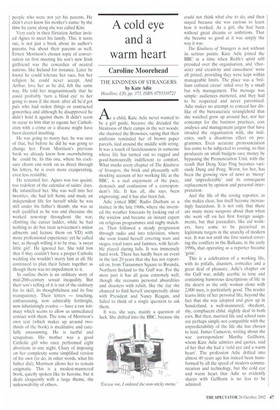A cold eye and a warm heart
Caroline Moorehead
THE KINDNESS OF STRANGERS by Kate Adie
Headline, £20, pp. 373. ISBN 0755310721
As a child, Kate Adie never wanted to be a girl guide, because she dreaded the bleakness of their camps in the wet woods; she shunned the Brownies, saying that their uniforms reminded her of brown paper parcels, tied around the middle with string. It was a touch of fastidiousness in someone whose life has turned out so rugged and good-humouredly indifferent to comfort. What marks every chapter of The Kindness of Strangers, the brisk and pleasantly selfmocking account of her working life at the BBC, is a real enjoyment of the pace, demands and confusions of a correspondent's life. It has all, she says, been engrossing; and it has also been fun.
Adie joined BBC Radio Durham as a trainee in the late 1960s, where she invented the weather forecasts by looking out of the window and became an instant expert on religious programmes and rugby matches. Then followed a steady progression through radio and into television, where she soon found herself covering wars and sieges, royal tours and famines, with Scrabble played during lulls. It was immensely hard work. There has hardly been an event in the last 20 years that she has not reported on, from Tiananmen Square to Rwanda, Northern Ireland to the Gulf war. For the most part it has all gone extremely well, though she recounts personal absurdities and disasters with relish, like the day she chanced to find herself unexpectedly alone with President and Nancy Reagan, and failed to think of a single question to ask them.
It was, she says, mainly a question of luck. She drifted into the BBC, because she
could not think what else to do, and then stayed because she was curious to learn how it worked. As a girl, she had been without great dreams or ambitions. That she became so good at it was simply the way it was.
The Kindness of Strangers is not without its serious points. Kate Adie joined the BBC at a time when Reith's spirit still presided over the organisation, and 'character and creativity and cussedness' were all prized, providing they were kept within manageable limits. The place was a `brilliant cultural circus' ruled over by a small but wily management. The message was simple: audiences mattered, and they had to be respected and never patronised. Adie makes no attempt to conceal her dislike of the bureaucratic stranglehold that she watched grow up around her, nor her contempt for the business practices, cost analyses and management jargon that have invaded the organisation with, she indicates, such a disastrous effect on programmes. Even accurate pronounciation has come to be subjected to costing, so that producers on small budgets save money by bypassing the Pronunciation Unit, with the result that Deng Xiao Ping becomes variously Dung and Pong. Worst, for her, has been the growing view of news as 'messy' and `unpredictable' and its consequent replacement by opinion and personal interpretation.
And the life of the roving reporter, as she makes clear, has itself become increasingly hazardous. It is not only that there are many more weapons about than when she went off on her first foreign assignments, but that journalists, like aid workers, have come to be perceived as legitimate targets in the anarchy of modern war. It was not until she first started covering the conflicts in the Balkans, in the early 1990s, that operating as a reporter became 'grim'.
This is a celebration of a working life, with its pitfalls, disasters, comedies and a great deal of pleasure. Adie's chapter on the Gulf war, mildly acerbic in tone and containing humorous descriptions of life in the desert as the only woman alone with 2,000 men, is particularly good. The reader learns little of her personal life, beyond the fact that she was adopted and grew up in Sunderland, a well-mannered, obedient, shy, complacent child, slightly deaf in both ears. But then, married life and school runs are perhaps simply not compatible with the unpredictability of the life she has chosen to lead. James Cameron, writing about the war correspondent Martha Gellhorn, whom Kate Adie admires and quotes, said of her that she had a 'cold eye and a warm heart'. The profession Adie drifted into almost 40 years ago has indeed been trans formed by all the speed of modern communication and technology, but the cold eye and warm heart that Adie so evidently shares with Gellhorn is no less to be admired.


















































































 Previous page
Previous page